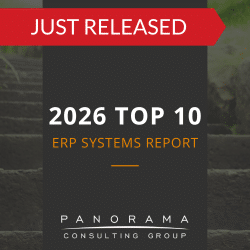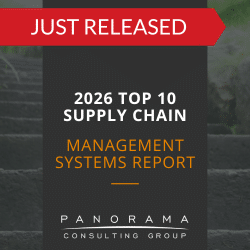- Most ERP project management tips revolve around tools, templates, and timelines—but the best leaders rely on disciplined thinking and behavioral cues that software can’t track.
- ERP implementation milestones lose meaning if project health isn’t tracked below the surface.
- ERP accountability starts with a project manager who exposes misalignments early.
- Overlooked ERP project health indicators include momentum, clarity, decision discipline, and vendor performance.
Successful ERP project management is about the subtle habits that create accountability, protect ERP implementation milestones, and keep teams grounded in reality.
Today, we’re sharing two mental checklists used daily by effective ERP project leaders. These checklists serve as early-warning systems and alignment tools that prioritize ERP project health and reinforce strategic discipline.
Daily Alignment: The ERP Accountability & Reality Check
ERP projects often go sideways—not because someone made a single bad decision—but because nobody noticed when assumptions stopped matching reality.
High-performing project managers (PMs) mentally walk through the following questions every day to hold both the team and themselves accountable:
1. Do key people still own key decisions?
Roles drift. Early champions step back. Steering committee members get pulled into other priorities.
ERP accountability erodes when decision-makers become passive observers.
The best project managers are constantly asking questions like:
- Is our RACI matrix still real, or just documented?
- Who actually made the last data governance call?
The 2026 Top 10 ERP Systems Report
What vendors are you considering for your ERP implementation? This list is a helpful starting point.
2. Are we working on the most valuable things today?
Every ERP team has competing priorities—data conversion, system configuration, user training. Without constant triage, teams can burn out on low-value tasks.
Successful PMs ask: Does today’s work advance a defined ERP implementation milestone? If not, is it urgent or just noise?
3. What’s the hardest conversation I’m avoiding?
Avoidance is expensive. A scope decision dodged today becomes a six-figure change order tomorrow. A stakeholder not consulted becomes a power user who never adopts the system.
Our ERP consultants have seen project management in all shapes and forms, but the most effective project management we’ve seen is leaders who develop a radar for discomfort and treat it as a project signal, not a threat.
4. Where are we tolerating ambiguity?
Whether it’s unclear data ownership, fuzzy process design, or vague training plans, ambiguity delays progress.
The most effective ERP project managers view phrases like “we’ll figure it out later” as a red flag. Instead of waiting until the final hour, they document uncertainties and escalate issues as soon as possible.
5. Is the vendor still showing up with discipline?
ERP vendors tend to overperform early and fade post-kickoff. Daily check-ins help detect this shift.
For example, a project manager might ask:
- Are vendor resources still engaged, or is their cadence slipping?
- Are deliverables suddenly being approved without the same scrutiny or stakeholder input?
Our Software Expert Witness team will tell you that vendor disengagement is often an early ERP project health indicator. When detected early enough, it’s fixable. Left unchecked, it spirals.
Daily Risk Scan: The ERP Health and Timing Radar
This second mental checklist zeroes in on timing and risk at the ground level, where ERP leaders catch the signals that dashboards and status decks miss.
1. Has anything shifted that invalidates our current plan?
Organizations evolve during ERP implementations. Maybe a new acquisition just closed. Maybe a key leader left.
The best PMs re-ask a basic question every day: Are we still planning for the business we started with?
If not, it’s time to revisit sequencing and priorities.
2. Is today’s issue a symptom or a signal?
If multiple testers struggle with PO matching, the issue isn’t just user error—it may signal flawed design, missing training, or bad master data.
Our ERP implementation consultants often tell clients that project managers with sharp instincts look for the pattern behind the pain. That’s how they turn isolated issues into true ERP project health indicators.
3. Are any core assumptions no longer safe?
ERP projects are built on dozens of assumptions—about team capacity, system capabilities, data readiness.
PMs should have a mental file labeled “fragile assumptions.” If one breaks, it often requires a bigger response than organizations expect.
Examples of fragile assumptions include:
- Assuming legacy system access will continue through testing
- Believing key integrations can be built last-minute
- Relying on a change champion who’s now sidelined
4. Are we falling into the “just go live” trap?
There’s always pressure to keep pushing forward, even when signs say pause. But high-functioning teams resist false urgency. They know that ERP implementation milestones only matter if they reflect readiness.
A successful PM looks beyond green status reports and asks whether data is clean, users are confident, and processes are stable under real conditions.
In our experience as ERP project recovery consultants, we know that once you go live, every unresolved issue becomes a production problem—with business consequences.
5. Where is momentum slowing—and why?
Sometimes it’s subtle: late deliverables, silent meetings, lack of pushback. Sometimes it’s more obvious: teams asking to defer testing cycles.
These are all early signals of fatigue or disengagement.
The best project managers don’t ignore these signals. They ask hard questions, dig in, and treat slowing momentum as a strategic risk.
Get More ERP Project Management Tips
You might not see these mental routines in your project plan, but they often determine whether the plan gets executed at all.
If you’re unsure whether you’re getting true visibility into project health, it might be time to bring in a third-party perspective. Contact our independent ERP consultants today.














